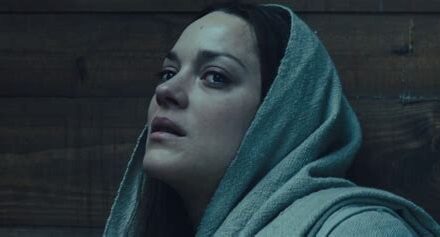Nine months ago, I wrote in this review about the sad tendency of today’s women to define themselves by the possession of one thing: power. That definition of “womanity” would surely have warmed Mrs. Nietzsche’s heart if there had been a Mrs. Nietzsche. Perhaps the ghost of Lou Salomé is celebrating somewhere though I cannot say for sure. In that article, I noted the strange lengths women—frequently young women—are willing to travel in search of bold females who have grasped the “One Ring that rules them all”—them men, that is.
Since power is the only virtue that matters, any woman who has it must be worthy of praise, excluding only those so weak as to rely too much on a man. Lady Macbeth, for two acts anyhow, fits the bill or so thought a student of mine last semester. Can it get any worse than that? That’s a matter of taste, perhaps, but I think a recent paper effectually has done so, revealing the new Queen of Power.
The woman in question? She’s none other than Grendel’s Dam (or as some prefer Grendel’s Mother), she of Beowulf fame. Those familiar with the Old English poem from the hazy, distant days of English Lit Survey will probably recall Grendel, the demonic monster who ravages Heorot, a Danish mead hall, until Beowulf, hero of heroes from across the water (in southern Sweden) arrives on the scene to rip off the monster’s arm and relieve the Danes of twelve years of misery. Of course, the Danes then honor the hero in good Danish fashion with songs and flowing mead.
What they didn’t know and what most ex-collegians forget as well is that Grendel has a mother. One can appreciate the memory lapse. After all, it’s no easy matter to imagine a little Grendel dandled on his mother’s knee, nursing happily, playing patty-cake. Perhaps grendelish motherhood doesn’t include such customs; for the record, a “grendel” is a spirit or monster from a swamp, fen, or larger body of water. No matter. When Grendel lurches back to his underwater lair to die, “Grendel’s Dam” returns bent on vengeance—all in the terms of feud, the blood code of the ancient northern world. She kills a venerable Dane as he sleeps in Heorot and returns to her den, only to die two hundred lines later at the hands of Beowulf.
But here’s the point: it’s not an easy fight. Beowulf had a pretty easy time with Grendel, which is saying something. Preferring to fight the monster hand-to-hand, he dispatched him, by all appearances, within minutes. Not so Grendel’s Dam. The Great hero uses weapons to fight her, and—the poet is very clear about this—she almost gets the best of him:
The son of Ecgtheow would have surely perished
And the Geats lost their warrior under the wide earth
Had the strong links and locks of his war-gear
Not helped to save him: holy God
Decided the victory. (1550 – 1554, Heaney trans.)
Hence, we have a victory for the hero, but more, a triumph of divine power.
That “holy God” saved Beowulf ought to be decisive, especially to those at a Christian university, but in the new world of feminine power, God doesn’t count for much. As a matter of plain fact, my student writer tended to minimize His presence, also virtually ignoring the business of the Grendel family’s being of the line of Cain. What surfaced as the real moral of the story is that a feminine agent can stand toe-to-toe with a man—a hero, no less. Demonic origins be damned: she is woman! Beowulf is lucky she didn’t set him in harness the way Lou Salomé did Paul Rée and Nietzsche in the famous and embarrassing photo they posed for in 1882 around the time Nietzsche discovered what power really meant.
This line of feminist thought may seem risible to all of you who are sane, but sanity is a rare commodity these days. Under such circumstances, I have to wonder who the next woman of the year will be—provided Grendel’s Dam can be surpassed. I will say I’m relieved that Satan in Paradise Lost (a poem I teach later this semester) is not Satanna or Lucifera; if he were so named, the debate about Milton’s hero would be finished, and I’d have to roll my eyes at a paper declaring “her” superiority to the Second Person of the Trinity.
In the meantime, empowered women search the pages of history, literature, philosophy, and theology to find templates of the goddesses they might become. The project can be tough going, especially since Western literature is still widely taught in whose pages pride is still a sin, but that problem can be solved by chucking the “so-called” canon—a cause the feminists at Berkeley, Middlebury, Evergreen, and Harvard can, like Grendel’s Dam, really sink their teeth into—or by deconstructing the great books as “racist” documents, examples of male dominance, or both.
It almost goes without saying, that’s what is happening on campuses across the country. Grendel’s Dam is on the prowl. Where’s Beowulf in this counter-culture mess? He’s assuring her that he was a chump, an unwitting tool of the Danes. Ashamed of his sword, his helmet, and arm-rings, he swims to the nearest university counselor to confess his hate-crimes and learn to find his inner Dam.
And nationwide, where pedestals that formerly supported heroes of America’s past—Columbus, George Washington, Thomas Jefferson, and, yes, Robert E. Lee—now sit empty, waiting for some figure to, so to speak, “occupy” the top of the plinth, there may soon stand monuments of empowerment in their place, all feminine. What better way to fill the vacancy than hundreds of statues of Grendel’s Dam, the once and future face of feminism: monstrous in the past, monstrous now, monstrous always, gaping maw open for the next kill.














